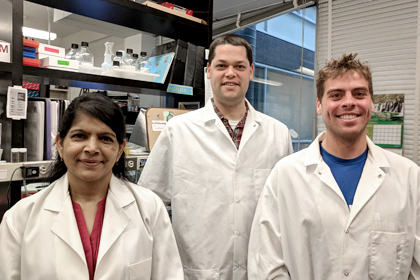
Arti Shukla, Ph.D., and lab team members Maximilian MacPherson and Phillip Munson.
Asbestos exposure is widely known to cause human disease, including the deadly cancer mesothelioma – although researchers aren’t sure why. While asbestos is inhaled into the lungs, mesothelioma develops in physically remote mesothelial cells. No successful methods exist for early detection of exposure to asbestos. New research published online in
The FASEB Journal, however, may have unlocked the first piece of this puzzle.
“Our findings suggest that cells in one region of the body are capable of sending messages to cells in a distant location, and can cause significant genetic changes,” said Arti Shukla, Ph.D., associate professor of pathology and laboratory medicine at the University of Vermont’s Larner College of Medicine and a UVM Cancer Center member. “This communication from injured or diseased cells to healthy cells has the potential to initiate changes that might lead to cancer or other diseases.”
To conduct the experiment, Shukla and colleagues used two groups of cells known to be the first to encounter asbestos fibers once inhaled: lung epithelial cells and macrophages. The researchers split these cells into one group that was exposed to asbestos, and another that served as a control group and was left to grow normally. The team let the cells grow in these conditions for three days, then collected the exosomes released by the cells.
First, the researchers examined the proteins inside the exosomes, discovering that the asbestos-exposed group had significant increases in many proteins of interest. Second, they added the exosomes to healthy mesothelial cells (which eventually can become mesothelioma cancer cells) and assessed gene changes after four days. They found that the exosomes from asbestos-exposed cells caused dramatic changes to many cancer-related genes in mesothelial cells.
These findings have implications for how asbestos exposure may cause cancer by sending exosomes that detrimentally alter the genetics of cells. The study also points to the remarkable potential of these exosomes and the proteins they contain to act as biomarkers, indicating the development or progression of asbestos-related disease.
“These intriguing findings go a good ways toward explaining the conundrum of how a pulmonary irritant triggers distant effects,” said Thoru Pederson, Ph.D., editor-in-chief of
The FASEB Journal. “They also add to the burgeoning array of studies that link exosome-based communication to pathogenic events.”
This research was supported financially by the U.S. Department of Defense and the National Institute of Environmental Health Sciences, National Institutes of Health.
(This article was adapted from a press release produced by Todd Bentsen, Director of Communications, FASEB.)